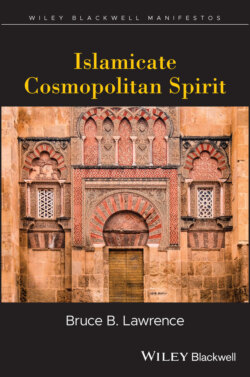Читать книгу Islamicate Cosmopolitan Spirit - Bruce B. Lawrence - Страница 12
Why Civilization? Because Every Cosmopolitan Has Civilizational Roots
ОглавлениеWhile there are many elements to Islamicate cosmopolitan, its central inescapable core is an interactive, civilizational framework. “Civilization” as a category has been, and will continue to be, disputed, but what is beyond dispute is the linking of civilization with civility and so with polis or city. Without civilization, civility, and cities there would be no cosmopolitan ethos, whether Islamicate, Persianate, Italianate, or Christianate.15 Herein lies a tension, between the verticality of “the cosmos,” and the horizontal rootedness of “the polis.” It is a tension to be explored below, but one should underscore that civility requires belonging to some polis or city place, and without that belonging there could not be the longing to make the world the larger—indeed, the largest—place of belonging.
The implications of the cosmopolitan turn augur a new paradigm dating back a mere 30 years.16 The paradigm meanders within and across the Afro-Asian ecumene, with huge implications for understanding Islamicate cosmopolitan. The first, critical link is historical. Islamicate did not originate with the coming of Islam; it had deep roots in Irano-Semitic social and institutional patterns. In other words, the traces of Islamicate cosmopolitan preceded the historical advent of Islam. A prominent sociologist, Armando Salvatore, explains the historical trajectory as follows:
On the one hand, Islamicate civilization revealed a strong rooting within the Irano-Semitic cultural world. On the other, by virtue of the articulation of Islam itself as a religious tradition that sealed the chain of Semitic prophecy while also integrating the rich and complex heritage of Persianate culture, it was particularly porous to inter-civilizational exchange. This is why Islam quickly acquired a uniquely expansive potential in cultural, as well as political, terms.17
By itself Islam does not account for the cultural legacy of Iran, the Persianate strand that pervades, and also redefines, Islamicate civilization, above all in the magisterial guise of spirit. There is a constant tension as well as interactive creativity between the Irano-Semitic, and also the Perso-Arabic, and then the Persianate-Islamicate folds of world history. Persianate is a direct consequence of Islamicate developments, even as it becomes the embodiment of Islamicate taste and influence through much of Central, South, and South-east Asia, including the Indian Ocean. It is not the dominance of one over the other but the continuous interaction of Persianate with Islamicate that expands the role of moral imagination and cultural productivity in Muslim-dominant regions of the Afro-Eurasian ecumene.
